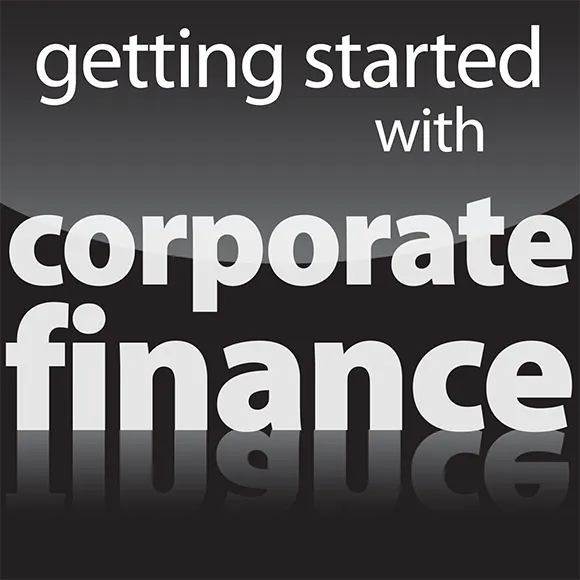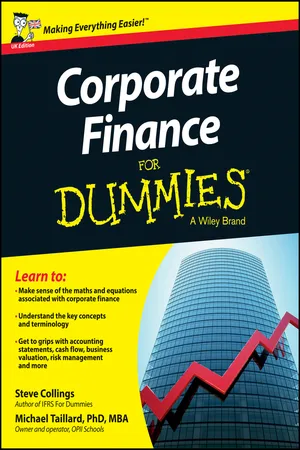Part I
Getting Started with Corporate Finance
For Dummies can help you get started with lots of subjects. Visit
www.dummies.com to learn more and do more with
For Dummies. In this part . . .
Bone up on the basics of corporate finance and become proactive with your corporate finance know-how.
Navigate your journey through the complex world of corporate finance, stopping off at the major organisations and visiting the major roles involved along the way.
Get to grips with how companies raise money by incurring debt and by selling equity.
Chapter 1
Introducing Corporate Finance
In This Chapter
Understanding the meaning of money
Looking at the study of corporate finance
Seeing the role corporate finance plays in your life
Making corporate finance work for you
Corporate finance is more than just a measure of money. In fact, as you discover in this chapter – where we talk about the nature of money, how it applies to corporate finance and how it connects to you and your life – money is somewhat incidental to finance. When you’re discussing corporate finance, you’re looking at the whole world in a brand new way that measures it and what it contains so as to make the information useful to people. You can calculate things in terms of corporate finance that you simply can’t measure accurately in any other way.
Part of the role of this chapter is also to introduce you to the book as a whole. Therefore, as part of helping you become proactive with your corporate finance know-how, we clue you into other chapters to allow you to follow your personal interests quickly and easily.
Considering Corporate Finance and the Role of Money in the World
Corporate finance is the study of relationships between groups of people that quantifies the otherwise immeasurable. (Corporate finance can also refer to a department, such as the corporate finance department in an investment bank that deals with advice given to companies about financial arrangements.) To understand how this rather wordy definition makes any sense at all, you have to take a quick look at the role of money in the world.
According to Adam Smith, an 18th century economist, the use of money was preceded by a barter system, in which people exchanged goods and services of relatively equivalent value. For example, if you worked growing hemp and making rope out of it, you’d give that rope to people in exchange for food, clothes or whatever else you needed that the people around you were offering.
But what happens when someone wants rope but that person has nothing you want, or you need food but no one needs rope? These times caused people to start using a basic form of money. So, you sell your rope to someone with nothing you want and he gives you a credit note for his services that you’re free to give to anyone else. You decide to go and buy some beer, giving the brewer the credit note, ensuring that the person who bought your rope would provide the brewer a service in exchange for giving you beer. Thus, the invention of money was born, though in a very primitive form.
Looking at money in this way, you come to realise that money is in fact debt. When you hold money, it means that you’ve provided goods or services of value to someone else and that you’re now owed value in return. The development of a standardised, commonly used currency among large numbers of people simply increases the number of people willing to accept your paper or coin IOUs. Therefore, that currency becomes easier to exchange among a wider number of people, across greater distances and for a more diverse variety of potential goods and services (for additional gloss on this account, read the nearby sidebar
Taxes started early).
Put simply, money is debt for the promise of goods and services that have an inherent usefulness, but money itself isn’t useful except as a measure of debt. People use money to measure the value that they place on things.
Imagine that you’re living in Ancient Egypt and you want to know the value of a goat. You can say that one goat is worth five chickens, but that doesn’t help you much. You can say that a bricklayer’s labour is worth half that of a brewer of beer, but you can’t measure that mathematically. Using these methods, you have no real way to establish a singular, definitive measurement for the value that people place on different things.
So, how can you measure value? By determining the amount of money that people are willing to exchange for different things. This method allows you to determine very accurately how people interact, what they value and the relative differences in value between certain things or certain people’s efforts. Much about the nature of people, the things they value and how they interact together become clearer when you develop an understanding of what they’re spending money on and how much they’re spending.
Eight millennia on from Ancient Egypt, in the modern era of money – well after the establishment of weighted coins to measure an equivalent weight of grain, the standardised minting of currency and after the origins of money were forgotten by the vast majority of the world’s population (welcome to the minority) – money begins to take on a more abstract role. People use it as a way to measure resource allocations between groups and within groups. They even begin to measure how well a group of people are interacting by looking at their ability to produce more using less. Success is measured by their ability to hoard greater amounts of this inter-personal debt. The ability to hoard debt in this manner defines whether the efforts of one group of people are more or less successful than the efforts of another group.
People use money to place a value on everything, which allows them to compare different items. Which one is better, apples or oranges? The answer is the one on which people place more value based on the total amount of revenues. Higher revenues tell you that people place greater value on one of those two fruits, because they’re willing to pay for the higher costs plus any additional profits.
When we say that corporate finance is the study of the relationships between groups of people, we’re referring to measuring how groups of people are allocating resources among themselves, putting value on goods and services, and interacting with each other in the exchange of these goods and services. Corporate finance picks apart the financial exchanges of groups of people, all interconnec...












